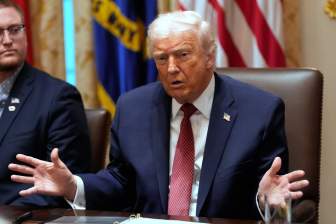The Chinese government is targeting Canadian elected officials but has not yet threatened “physical harm” against MPs or their families, Canada’s domestic spy agency says.

The Canadian Security Intelligence Service (CSIS) told Global News that the agency is aware that the Chinese Communist Party is targeting “elected officials from all parties, and all levels of government, across Canada.”
But the spy agency said that those threats have yet to cross the threshold to potential physical harm to MPs or their family members.
“To date, (the People’s Republic of China’s) foreign interference targeting of elected officials or their families has not amounted to any threat of physical harm,” agency spokesperson Evan Balsam said in a response to Global News.
“That said, CSIS is committed to equipping elected officials to identify foreign interference threats and take measures to ensure their personal safety.”
The Liberal government has faced months of questions over how it handled warnings of alleged foreign interference in both the 2019 and 2021 general elections. The scrutiny was prompted after Global News reported that national security officials warned the government of a sophisticated interference network, allegedly connected to the Chinese government, operating in Canada.
But CSIS found itself in the spotlight after the Globe and Mail reported last week that the agency produced a report in 2021 suggesting Canada was a prime target for the Chinese government, and that the agency was aware of threats to MPs and their associates.
- Officials stress Calgarians must save water after Bearspaw main break sees no drop in usage
- Yukon-Alaska border rocked by 3 earthquakes in final hours of 2025
- Tariffs ‘still crippling,’ Canada’s cabinet makers say as increase paused
- This is when you’ll get GST tax credits and other federal rebates this year
Citing an unnamed national security source, the Globe reported one of those MPs was Conservative Michael Chong, who has family members living in Hong Kong. The House of Commons voted unanimously earlier this week to have a committee probe the alleged targeting of Chong’s family by China’s Ministry of State Security.

Get daily National news
While Prime Minister Justin Trudeau initially suggested CSIS did not circulate that intelligence to senior officials, the Privy Council Office (PCO) later confirmed that the information was circulated to that department and other national security agencies.
PCO said on Friday that while the information was sent to the office of Trudeau’s national security and intelligence adviser in 2021, that office did not flag the report to either the Prime Minister’s Office or other government departments.
What is not known is the nature of the alleged targeting of Chong’s family, or what other MPs were singled out by Chinese intelligence agents. In the agency’s 2022 public report, released earlier this month, CSIS said it had briefed 49 MPs about the “foreign interference threat” that year — but not whether those MPs were themselves targeted.
Global News asked CSIS whether a threat of physical harm against an MP or their families would cross a threshold where the agency would take action, or to sound alarm bells more widely. The agency did not respond as of deadline.
“We take any allegation of foreign interference very seriously and use the full mandate of the CSIS Act in order to investigate, advise the Government of Canada, and address these threats,” Balsam, the agency’s spokesperson, wrote.
The issue of foreign interference in Canada is not new, nor is it limited to the actions of adversarial countries like China or Russia.
A March 2020 report from the National Security and Intelligence Committee of Parliamentarians (NSICOP) found that Canada has been the target of “significant and sustained” interference operations. While the report gave extensive public evidence of foreign interference in Canadian affairs, it was quickly buried as the world grappled with the onset of the COVID-19 pandemic.
While the spate of news coverage has focused on the 2019 and 2021 elections, NSICOP’s report identified foreign interference as a significant problem — targeting politicians of all stripes — that pre-dated both those elections.
The report also noted that foreign interference does not just target Canadian politicians, but diaspora communities in Canada that can face harassment, intimidation and surveillance by foreign powers.
NSICOP called on the government in 2020 to develop a comprehensive plan to address foreign interference activities in Canada. Three years later, many of the committee’s recommendations have not been enacted.








Comments